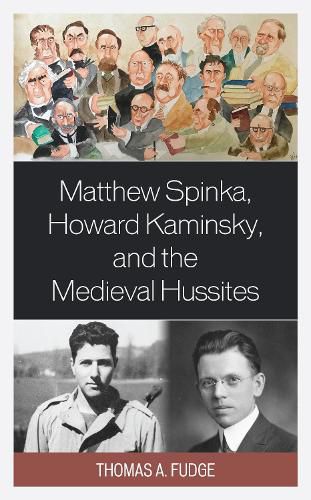Readings Newsletter
Become a Readings Member to make your shopping experience even easier.
Sign in or sign up for free!
You’re not far away from qualifying for FREE standard shipping within Australia
You’ve qualified for FREE standard shipping within Australia
The cart is loading…






The Hussite movement in Bohemia is an essential component for understanding the general history of medieval Europe and the Hussite period is a critical event for the development of western civilization. Matthew Spinka and Howard Kaminsky stand at the forefront of scholarship introducing this subject to the Anglophone world. The author argues their role in the religious historiography of late medieval Europe is a precursor to global medievalism. Combining commitment to the Christian faith with firm opposition to the Soviet-mandated Marxist-Communist ideology that dominated twentieth-century Czechoslovakia, Spinka strove to present Jan Hus as a medieval figure driven by religious devotion. Motivated by Jewish atheism and a modified form of Marxist analysis, Kaminsky rescued the medieval Hussites from oblivion, and political agendas, and presented them to the English-reading world. The author explores biography, history, and historiography as an essential intellectual segue between late medieval Hussites and modern scholarship. The book takes into account salient biographical details, provides an evaluation of the work of both historians, elaborates their methods, assesses their interpretations, and analyzes their historiographical significance for the study of Hussite history. This book is also a valuable contribution to understanding the writing of history.
$9.00 standard shipping within Australia
FREE standard shipping within Australia for orders over $100.00
Express & International shipping calculated at checkout
The Hussite movement in Bohemia is an essential component for understanding the general history of medieval Europe and the Hussite period is a critical event for the development of western civilization. Matthew Spinka and Howard Kaminsky stand at the forefront of scholarship introducing this subject to the Anglophone world. The author argues their role in the religious historiography of late medieval Europe is a precursor to global medievalism. Combining commitment to the Christian faith with firm opposition to the Soviet-mandated Marxist-Communist ideology that dominated twentieth-century Czechoslovakia, Spinka strove to present Jan Hus as a medieval figure driven by religious devotion. Motivated by Jewish atheism and a modified form of Marxist analysis, Kaminsky rescued the medieval Hussites from oblivion, and political agendas, and presented them to the English-reading world. The author explores biography, history, and historiography as an essential intellectual segue between late medieval Hussites and modern scholarship. The book takes into account salient biographical details, provides an evaluation of the work of both historians, elaborates their methods, assesses their interpretations, and analyzes their historiographical significance for the study of Hussite history. This book is also a valuable contribution to understanding the writing of history.